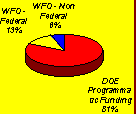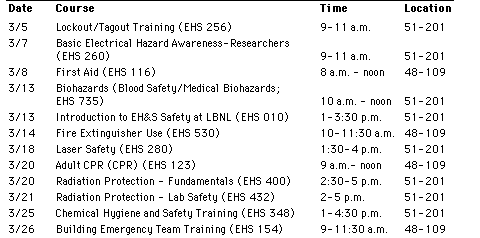


The last time Berkeley Lab job descriptions underwent a significant Laboratory-wide review, most employees were still using electric typewriters. Today, 20 years later, the Laboratory is in the midst of its most comprehensive review and update of job classifications ever attempted.
Since 1994, when about 1,100 scientists and engineers were mapped into a new classification structure, the Human Resources Department has been working with supervisors and managers to systematically review job "families" throughout the Laboratory. The entire redesign process is expected to conclude sometime next year.
The goal of the effort is to establish a consistent and equitable compensation process. This will ensure that job families accurately reflect work performed, with pay grades closely tied to comparable jobs within the labor market.
"Our classification descriptions have been so vague that it has been difficult for supervisors to determine, and for employees to understand, the classification that is appropriate for a given position," said Klaus Berkner, Deputy Director for Operations. "This Berkeley Lab uniqueness has also made it challenging to compare salaries to the market.
"The changes being made should benefit both the Laboratory and the employee," Berkner said. "We want to develop market-driven pay ranges within which individual salaries are determined, and to identify career paths and promotional opportunities. For example, if a non-exempt employee has as a goal to obtain an exempt position, he or she can see what it will take in terms of knowledge, skills and work experience."
"We need to ensure that our current titles and pay plans are keeping up with the Laboratory's changing mission and work environment," said Human Resources Director Walter Blount. "Our compensation program must be flexible enough to support our multi-disciplinary efforts and yet allow us to link our salaries to appropriate labor markets. Our focus should be rewarding performance and overall contribution."
New job families and classification levels are developed by Human Resources representatives, in consultation with supervisors and managers, to reflect the needs of the Laboratory. Reviewers pay close attention to descriptions commonly used in the marketplace.
The process of placing employees into appropriate job families based upon their duties and responsibilities is called "leveling." Leveling involves separating each position into certain compensable factors and then rank-ordering each position on the basis of each factor. Six factors are used to evaluate most jobs at the Laboratory--knowledge and skills, independence of action, working relationships, supervision of others, education/work experience, and overall impact. Job families can have several levels--for example, entry/intermediate, journey, and specialist. Pay ranges are assigned to classifications, based upon market comparison data established from surveys gathered in Human Resources.
After supervisors complete the leveling process, a Review Team, composed of division and program administrators and Human Resources representatives, collects position descriptions and reviews each proposed reclassification for consistency. In case of disagreement over the appropriateness of the proposed classification level for a position, supervisors may be asked to provide additional supporting information.
According to Blount, the majority of employees' salaries at Berkeley Lab will not be affected by the new classifications.
By last year, some 230 additional positions in the scientific and engineering areas and 200 research associate positions had been completed. Currently in the process of being reviewed are about 500 exempt and non-exempt administrative positions, which are slated for completion by the end of June. A review of all other jobs, mostly technical, will follow next year.


University researchers labor under a fundamental misconception, says Columbia University professor Richard Nelson. They believe that the lion's share of federal funding has gone to basic, as opposed to applied, science.
Speaking here on Feb. 23 for the "Science and Technology in a Competitive World" lecture series, Nelson said the belief is a myth dating back 50 years.
During World War II, Vannevar Bush, who was Franklin Roosevelt's science advisor, authored the report "Science-The Endless Frontier," which many believe led to a Golden Age of science. Bush contended that research is inherently unpredictable and serendipitous and that it should be funded without thought of practical ends. Furthermore, he maintained, basic research is the pacemaker of technological innovation.
"Bush saw science as the goose that lays the golden egg," Nelson said. "In his model, the government supports basic science at universities, which opens up new technological possibilities. Industry then comes in and plucks them up."
Nelson said the conventional wisdom--that federal funding of university research has followed the Bush model, creating a pipeline of new products--is mistaken. Since the Bush report, more than half of the funding has been applied, Nelson said. Much of it has been related to defense, national security, agriculture, and health.
"The bulk of academic research has been funded by mission-oriented federal agencies such as the Department of Defense and National Institutes of Health," he said. "Many believe this is a recent development, but much of academic research has always been directed towards a mission. There is nothing new here."
While not successful in his advocacy of basic research, Nelson said Bush was effective in stimulating federal support for academic research. This post-World War II increase overlapped with an era when industry cut back its support.
Nelson, who is the George Blumenthal Professor of International and Public Affairs, Business and Law at Columbia, has intensively studied public policy as it affects high-technology industries. He said that circa 1973, a sea change happened in terms of federal science and technology policy. Economic growth slowed, and Japan emerged as an economic force. The focus of federally-funded research shifted towards keeping American industry competitive. Nelson said that for the most part, this has been a mistake. Universities and national labs began focusing on property rights, which resulted in an explosion of patents, but not in a significant increase in the number of inventions. Rather than the rate of invention, he said, it was the pursuit of patents that had changed.
Nelson said that aside from policy issues, the emergence of biotechnology has generated a boom in patents. Other patents seem to be concentrated in the fields of engineering, chemistry, and medicine. Despite this, he argued that the idea of the university as a womb for the development of new products is misbegotten. Research tools, research techniques, and basic knowledge are the real fruits of university research, he said.
Nelson said he is an advocate of research institutions affiliated with universities, such as Berkeley Lab. These institutions provide a degree of insulation from industry's demands for immediate results. He said they allow that which is increasingly rare: The pursuit of long- range research.

The Department of Energy, through BASTEC, the 6-year-old collaborative program with the Oakland public schools, is planning to participate in NetDay in Oakland.
For information on volunteering your time in an Oakland school, or any other area school, please check out the following web site: http://www.netday96.com/. You may sign up for the school of your choice directly via this Web page. Volunteers are needed at all skill levels, including the "willing volunteer" level.

Technology Transfer Department Head Cheryl Fragiadakis presented an overview of current tech transfer issues at a forum held at the Lab on Feb. 27. Among the topics covered at the meeting were trends in federal funding for tech-transfer, policy and personnel changes at DOE, government funding vs. industry partnerships, tech-transfer programs under siege, and the proposed Morella Bill, which is aimed at improving access to national labs.
According to an AAAS analysis of the House-proposed balanced budget plan, Fragiadakis said, U.S. funding for science could drop one-third by the year 2002. Projections indicate a downward spiral for most agencies. Funding for technology transfer in DOE has taken big hits. At the national level, Energy Research's tech-transfer program has gone from $57 million in FY95 to $18 million in FY96. Defense Program funding has dropped from $210 million to $150 million in the same time frame. Berkeley Lab has had to cancel several projects, and re-scope others.
At the same time, national labs continue to receive mixed messages from Congress. "Set aside" funding programs are under fire. DOD's Technology Reinvestment Program, and DOC's Advanced Technology Program are threatened with extinction. Yet both houses of Congress recently passed similar versions of the Technology Transfer Improvement Act of '96 (Morella Bill) that would establish intellectual property rights for companies participating in cooperative research and development agreements and improve incentives for industry/lab collaborations.
Fragiadakis noted that Berkeley Lab receives 81 percent of its funding from DOE, 6 percent as "work for others" from non-federal, and 13 percent as "work for others" from other federal agencies. As federal research dollars dwindle, the Technology Transfer Department aggressively seeks research partners, both for collaborative research, and to license the Lab's patented technologies. In the last two years, the Lab has received research funds from a number of private firms. These include Amgen, Roche Bioscience, Pacific Gas & Electric, IBM, Southern California Edison, Gas Research Institute, Intel, Eaton Corporation, and Rhone Poulenc. Licensing is beginning to generate modest income for the Lab as well.
Funding from industry is growing, Fragiadakis said, but it still represents a very small percentage of total needs. Tech Transfer's goal is to increase alternative funding. To strengthen its marketing to industry and meet the challenges of reduced funding, Tech Transfer works in teams with Berkeley Lab researchers in the negotiation of non-disclosure, materials transfer, and licensing agreements; co-sponsorship of workshops; project management for work with private industry; and development and implementation of industry marketing programs.
There is also a need to disseminate tech-transfer information to more researchers at the Lab. The Tech Transfer Department hopes to support programmatic funding through increased use of e-mail to announce funding opportunities, visits by industry, and "$4K Tech Assistance" deals. For more information about technology transfer at the Lab, contact the department at X6467 or [email protected].

Berkeley Lab Funding--FY95


Beginning March 5, the blocks will be moved from Bldg. 51B between 7 a.m. and 3 p.m. each Tuesday and Thursday. Approximately 150 truck trips will be required to move the blocks over a 7-10 week period.
In order to minimize the impact on Lab traffic, the trucks will enter the Bldg 51B yard by using the downhill lane on Lawrence Road below Bevatron Circle. Please proceed with caution in this area and observe flagman directions for traffic safety. Also observe caution at the horseshoe bend for uphill bound trucks as they must "cheat" into the downhill lane to negotiate the turn. Caution signs will be in place on shipping days as a reminder. Questions or comments should be addressed to Block Project Manager Bob Stevenson at X7724 or [email protected].


Introduction to EH&S Safety at LBL (EHS 010), 1 - 3:30 p.m., Bldg. 51-201
March EH&S class schedule

Pre-registration is required for all courses except Introduction to EH&S. To pre-register for all other classes, send a fax to X4072 with your name, employee ID number, extension, and class name, date & code (or call X5999).


'85 BMW 325e, 1 owner, most service records avail., 5-spd, snrf, pwr windows,162K mi., runs well, needs some body work, $2K/b.o. Michelle, X4694, 530-9365 (eve.)
'88 FORD Escort, orig. owner, 64K mi., 5-spd, 4-dr w/hatchbk, gd. cond., $2500/b.o. Phil, 528-0749
'89 HYUNDAI Excel, 4-dr, 80K mi., AM/FM cass., p/s, p/b, new tires, clutch & belts, silver, runs great, $1290/b.o. Edas, X7780, 848-6137, 849-1147
'90 PLYMOUTH Grand Voyager SE, 124K mi., V6 w/overdrive, exc. cond., $8600. Jay, 524-7597 (eve.)
'95 SATURN SL2, gold, 4-dr, a/c, all pwr, 1.9L DOHC, 124 HP engine, alloy wheels, warranty, 8.6K mi., $14,650. Clay, 376-4481
MOTORCYCLE, '82 Yamaha Seca 650, exc. cond., $1800. Judy, X6540, 631-6642
SNOW CHAINS for compact car, used once, $20. Rich, X5896, 524-8897
EDUCATIONAL SOFTWARE and games, Macs, 386s, 486s, VCR, calculators, books (story, coloring, texts, and dictionaries) to tutor children age 4 through 20 at Mercy Street Housing Project. Volunteer tutors also needed one evening every other week. Alicea, 849-3321
DISHWASHER, GE, built-in, works well on all cycles, $50/b.o. Philip, X6583
GOLF CLUBS, Dunlop Diamond Max, used twice, 1-3-5 metal wood, 3-9 iron, wedge, putter, incl. bag and cover, $900 new, sell for $450/b.o. Mark, X6781, 524-5234
GOLF CLUBS, set of "Sting", used twice, irons are 2 through sand wedge, 3 metal woods, swing weight D-1, stiff shafts, standard grips, cost $650 new, sell for $450 firm. Kathy, 837-7062 (eve.)
LIFT TICKET VOUCHERS, Squaw Valley, reg. $45, $38; men's ski boots, Nordica, blk, sz. 11, $100; ladies ski jumpsuit, white w/other colors, sz. 10, $50; water filters, NSA, sink models 50C & 100S. Marek, X5029, 582-5867
SPEAKERS, Polk Audio, monitor series #5, 3-way, 22"h x 10"w x 9"d, $200/b.o. John, X5523
TABLE, solid wood w/veneer top, 60" X 42" & 7 gd chairs, $200/b.o. 763-6258
TELEVISION, 20" RCA, w/remote, '92 model, $150. Steve, X6966
WASHER for clothes, compact, portable, $350; stereo cabinet, wood w/glass doors, $30; men's 10-spd bike, 25" frame, $25; gas range, $200. Rich, X5896, 524-8897
BERKELEY, 2 rms avail. in furn. home, nr UCB & Rose Garden, washer/dryer, views, frpl, hot tub, decks, avail. 3/1, $450 & $500/mo. David, 525-4470
BERKELEY, furn. 1-bdrm summer sublet, Northside, residential neighborhood, hardwd flrs, many closets, well maintained, avail. 5/14-8/20, $700/mo. incl. utils. Kristine, 843-0160
BERKELEY, Elmwood area, furn., 1-bdrm apt in duplex, $650/mo + utils. and dep., avail. thru 1996, possibly longer. Lara, X7276, 548-4832
BERKELEY HILLS, unfurn. studio apt, short walk to LBL, LHS, AC bus, quiet, garden, view, $425/mo. incl. utils., plus occasional pet-sitting. John, X5307, 841-7875
CASTRO VALLEY, 2 bdrms avail. in home, one w/pvt bth, laundry & kitchen privs., short/long term, rent + dep. negot. Marek, X5029, 582-5867
CONCORD, 1-bdrm condo, upper unit, quiet complex, new carpet/paint, pool, deck, laundry fac., nr Hwys 4 & 24, walk to BART, water, garbage, basic cable, refs. req'd. $575 + dep. (neg). Martin/Bobbie, 370-6002
EL CERRITO, furn. 2-bdrm townhouse, 1-1/2 bth, 2-car garage, washer/dryer, inner courtyard nr swimming pool, avail. 4/1-9/30, $850/mo. 525-2135
HERCULES, share 3-bdrm home, laundry & kitchen privs., $350/mo. + util. 799-6226
OAKLAND, nr Mormon Temple, 2-bdrm house, share bathrm during weekdays, prefer female, $700/mo. + dep. 531-2058 (msg.)
OAKLAND, Mormon Temple neighborhood, quiet, country setting, lg. rm, pvt bth, share kitchen & utils., $450/mo. 530-7759 (msg.)
WALNUT CREEK, unfurn. 2-bdrm, 1-bth apt, in duplex on hill, Mt. Diablo view, upper unit, washer/dryer installed, fully equipped kitchen, carport, a/c, lg. yd, dog or cat acceptable, 5-min. walk to BART, 1 yr. lease, avail. in March, $875/mo. + utils. & dep. Denise, 935-2285 (eve.)
WANTED: housing in No. Berkeley for 2 yrs., desire sunny, hardwd flrs, W/D hookups, garden & parking. Jonathan, 524-0778
WANTED: 2-bdrm, 1-bth or 3-bdrm, 2-bth house for family of 3 (me, wife & 3 yr. old), or us plus housemate, prefer No. Berkeley & Albany areas, non-smokers, can afford up to $1K/mo. for us, or $1300/mo. w/housemate. X7916
WANTED: 2-bdrm house/apt to rent for 3 mo. starting 3/1. Jacob, X4606
WANTED: furn. 2-3 bdrm house/apt for visiting Danish research fellow, husband & 3 kids, non-smokers, 4/5-6/31 possibly extended to 12/31 w/another Danish family. Susanne, +45 3532 3940 (FAX), [email protected]
WANTED: visiting French scientist, spouse & 3 children, want to exchange 4-bdrm apt in center Paris for house near LBNL starting 6/20 until end of Aug., car exchange also possible. 33 1 43389440 (France), [email protected]
WANTED: 3-bdrm house for working couple, Berkeley/Rockridge area, 6/1. Christa & Harrie, 845-4980
WANTED: furn. house/apt for visiting teacher & wife (no children), 6/23-8/23, East or No. Bay Area, willing to commute to LBNL; also willing to exchange home nr Boston (Marblehead, MA). Karin, X5513, Michael, (617) 631-6860
WANTED: furn. 1-bdrm/apt for visiting scientist, female, nonsmoker, 3/1-5/31, No. Berkeley or East Oakland. Maria, X4135